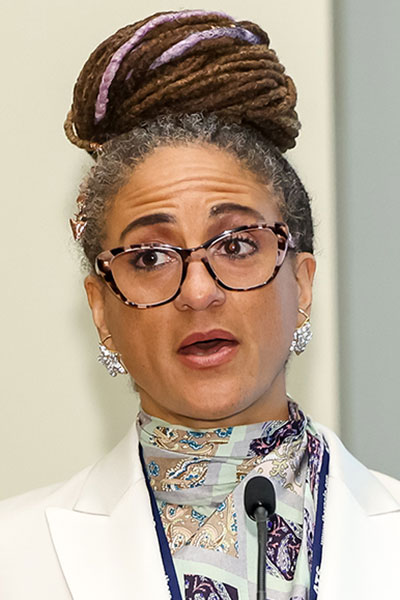Researchers believe their efforts to improve the health of orangutans may also advance approaches to human respiratory disease. In an interview-style discussion during the Plenary Session on Tuesday, May 21, the editor-in-chief of the Journal of Zoo and Wildlife Medicine, veterinarian Nancy Lung, VMD, MS, and International Conference Committee Chair-Elect Jennifer Taylor-Cousar, MD, MSCS, ATSF, will discuss their work exploring this possibility.

“Saving the People of the Forest, One Chocolate Bar and One Nebulizer Treatment at a Time” will take place from 11:45 a.m.-1 p.m. PT in Ballroom 20B-D of the San Diego Convention Center. ATS President M. Patricia Rivera, MD, ATSF, and International Conference Committee Chair Debra Boyer, MD, MHPE, ATSF, will moderate the discussion.
“Orangutans, critically endangered great apes native to Borneo and Sumatra, are 97% genetically homologous with us, and can therefore contract human respiratory pathogens,” said Dr. Taylor Cousar, an adult and pediatric pulmonologist at National Jewish Health.
The deforestation of millions of acres of rainforest to grow trees that produce palm oil is impacting their environment in a way that is resulting in the possible extinction of orangutans. As one of our closest relatives, the impact on their environment affects humans, too. Through conservation efforts and medical treatments used in human lung disease, Drs. Lung and Taylor-Cousar will discuss how we can improve the likelihood of the survival of orangutans as a species and the environment that affects respiratory health.
“We have demonstrated that orangutan respiratory disease syndrome (ORDS) responds to therapeutics used in the treatment of human bronchiectasis,” Dr. Taylor-Cousar said. “Observation of disease presentation and response to prescribed therapeutic intervention along with identification of genetic contributors to respiratory disease in orangutans may provide new insights relevant to human chronic airway disease, and human efforts to treat orangutan respiratory disease and to protect their habitats will prevent their extinction.”
ORDS is present in 20 to 40 percent of orangutans and accounts for almost a third of adolescent and adult orangutan morbidity and mortality, she explained. The respiratory syndrome is characterized by chronic sinus drainage, infection of the laryngeal air pouch (air sacculitis), gram-negative rod infection, and bronchiectasis.
The Plenary Session will also include the ratification of the 2024-2025 slate of officers, as well as remarks from outgoing President M. Patricia Rivera, MD, ATSF, and incoming President Irina Petrache, MD, ATSF.
In addition, the following awards will be presented:
- Outstanding Educator Award
- Research Innovation & Translation Award
- Outstanding Clinician Award
Extend Your Learning Beyond San Francisco with ATS 2025 Conference Highlights

With so many valuable educational opportunities offered during the ATS 2025 International Conference, attendees are often forced to decide which sessions to prioritize. That’s why the Society is offering three ATS 2025 Conference Highlights packages for those unable to attend ATS 2025 San Francisco or attendees interested in continuing their education after the conference. Check out the packages and pick the one that’s right for you. Learn at your own pace, whenever and wherever you are!

